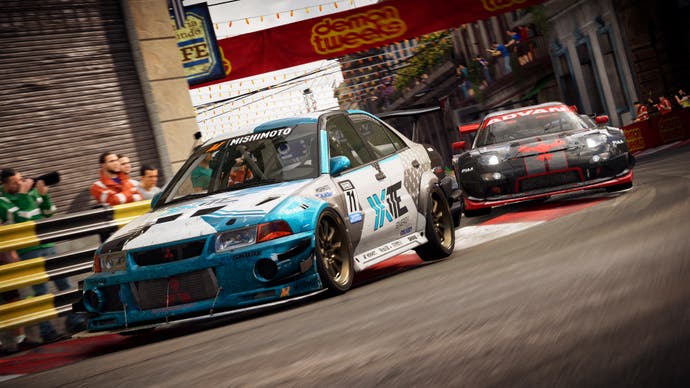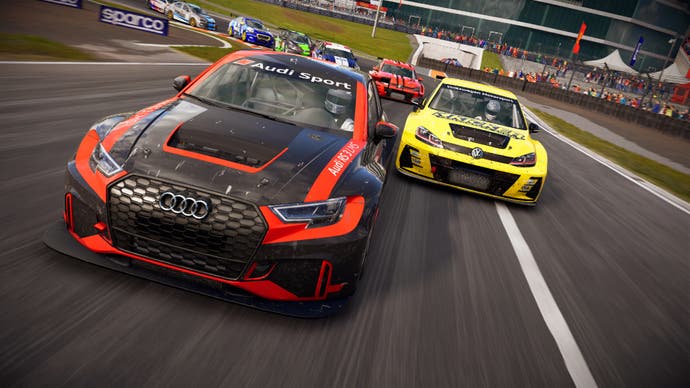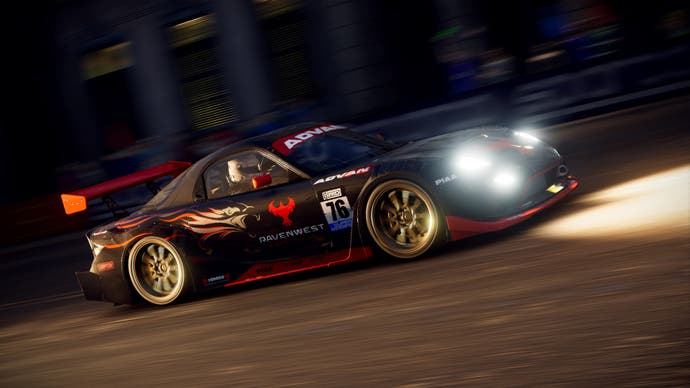Grid feels a lot like the original - for better and for worse
Off-grid.
Has it really been eleven whole years since Codemasters' Race Driver: Grid? Well, I've just checked Wikipedia and I can confirm that yes, it very much has - and, oh my, so very, very much has happened since then.
First there's the pivot at Codemasters away from that type of all-ages action towards more sim-minded games like Dirt Rally and the latter F1 games, and then the small matter of the dissolution of the arcade racer. It's not that they don't really make them like they used to - this generation, at least, they don't really make them at all.
Indeed, you have to look elsewhere in the midlands for that kind of accessible racing. A few miles down the road from the Southam campus where the new Grid is being made, a number of Codemasters staff set up Playground Games and went on to mark that territory as their own with the brilliant Forza Horizon series. It's interesting, then, that the Grid reboot is being headed up by Forza Horizon 4's chief designer Chris Smith.

It gives this reboot some neat symmetry, with Smith having worked under Codemasters alumnus Ralph Fulton at Playground - and with Fulton having been instrumental in many of the innovations that made the original Grid so beloved. Back then it was all about the rewind system, as well as providing a more characterful brand of racing. This time out, it's about the drama of motorsport - the unpredictable, out there moments that give motorsport so much of its appeal.
It's about a Volvo 850 barrel-rolling in front of you as you lunge for the small space it leaves on the track it just departed, or the rivalries that emerge over the course of a race that are then settled by door-handle to door-handle moments. It's about being able to tell stories - not through the pre-rendered cutscenes or dramatics of the older Grid games, but through the more emergent systems that are in play out on the track.

There's a small irony in Grid pointedly moving away from that old way of doing things when its stablemate F1 2019 - made at Codemasters' Birmingham studio - introduces cinematic and outlandish characters of its own, though Grid also benefits from the incredible AI found in that game's offline mode. It's emboldened by a few extra flourishes here; there's a nemesis system that kicks in if you get a little too intimate with another driver, and once you've crossed a certain threshold that driver will become enraged, doing all they can to overtake and then impede you.
There are rivalries and AIs with their own distinct characteristics, all feeding into action on track that certainly feels distinct. Grid's races are boisterous, bolshy things that certainly leave you with a story or two to tell, and it's all helped along by the game's own choreographer - like Left4Dead's director, it pushes along the flow of action, introducing elements like mechanical failures and driver mistakes.
In my own brief experience, it works, and there's a flavour to Grid's action that is distinct. It's elbows-out, enjoyably combative stuff - kind of like you're sharing the track with a dozen angry Matt Neals - and after the slightly wayward Grid 2 and Grid Autosport, it's wonderful to discover that the series has regained its sense of purpose. It's even better to discover that the focus here is almost entirely on-track, with little of the nonsense that blighted Grid 2. You can recruit sponsors and team-mates, as before, but ultimately you're left to indulge in Grid's various disciplines as you see fit, and it's possible to muddle your way through the campaign without winning a race. Here's a game that wants a fifth place finish to feel special, and it's all the better for it.

At the heart of this Grid is a lightness of touch, and an accessibility, that feels very welcome. The handling team here is the same that made Dirt Rally 2.0 sing, and there are depths to be found - I took a 911 RSR for a spin around Sepang, and indeed found myself spinning a little too much thanks to my own heavy right foot - which can be navigated easily enough by switching assists on. "It's where sim players go to have fun," says director Smith of where this Grid sits on the spectrum between arcade and sim, "and it's where casual players go to have serious fun."
That much is all apparent from playing through a handful of events across all of Grid's disciplines, with GT cars feeling suitably planted while muscle cars carry their considerable weight amply. It's wonderful to have the balancing act that the original Grid carried off so well back, essentially, though the only problem right now would seem to be that a bit too much of the original Grid is back with not enough new to help distinguish it. Within its fairly meagre course selection - there are some four city tracks and eight traditional tracks, although between them they do offer some 82 different routes - there's a lot of repetition and recycling, to the point where at times this feels more like a remaster than a reboot.
Maybe, after all those years away, that's not going be such a big problem though. Grid went a little wayward in the intervening years, as indeed did Codemasters, but the likes of the latter F1 games and Dirt Rally have shown that the studio is back on the right course. The new Grid isn't shaping up to be quite the game-changer that the original was, though it's certainly grand to have it - and games of its ilk - back on track.


